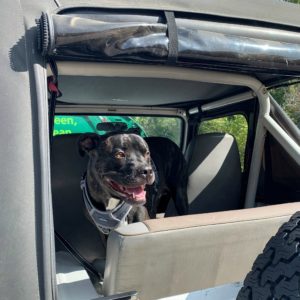Ellie Wagley talks about Banjo, and the unbreakable bond they’ve formed.
Video: Chase Baker/College of Veterinary Medicine and Biomedical Sciences
The staff at the Flint Animal Cancer Center expect to receive a range of medical records from veterinarians referring patients diagnosed with cancer for treatment. They never expected to receive a personal letter from the person closest to one particular patient explaining the unique journey they had traveled together to the center, which is part of the James L. Voss Veterinary Teaching Hospital at Colorado State University.
In August, the clinical trials team at the center opened a letter from Ellie Wagley, whose service dog, Banjo, was scheduled to begin treatment for B-cell lymphoma.
In that letter, Wagley described how Banjo had come into her life through a Vietnam veteran, and how he became her service dog to help with some issues stemming from her time serving in Afghanistan. Not only has Banjo saved her from countless panic attacks, nightmares, and bouts of depression, Wagley wrote, he has also helped her with the pain from her own experience with cancer.
In June 2015, Wagley was diagnosed at age 27 with stage 3a breast cancer. A little over a year later, Banjo arrived.
Wagley said it was rough at first. She had just had a hysterectomy and wasn’t allowed to carry more than five pounds. Banjo weighed six pounds.
“We had to learn the stairs really fast,” she said.
Pet Cancer Awareness
Banjo is one of millions of pets who will be diagnosed with cancer this year.
In fact, one in four dogs and one in five cats will develop cancer in their lifetimes. Forty years ago, pets with cancer had few options. Today, 50% of cancer in pets is manageable or curable with surgery, chemotherapy, radiation or a combination of cancer treatments.
November is Pet Cancer Awareness Month. Just like with people, early detection can make a difference. Learn the pet cancer warning signs.
Banjo also learned basic commands, including sit, stay, shake and bark. “Then, he learned to help me when anxiety came knocking,” Wagley said.
Diagnosis brings them closer

Banjo sleeps close to her – on the side of her neck – when she has nightmares or trouble sleeping. He loves French fries, yogurt and bananas. He likes to squish his sister, an orange tabby cat, and he loves playing with kids.
“He’s really good at camping, yelling and chasing tennis balls, but mostly he’s good at loving,” she wrote.
Banjo’s cancer diagnosis brought Wagley back to five years ago, when she started chemotherapy. She also recently started an internship as a social worker at Brent’s Place, a safe-clean apartment facility for children facing cancer and immunocompromising illnesses. The internship will help her complete her bachelor’s degree in social work through Metropolitan State University of Denver.
“For some reason, the universe has seen fit to fill my life with cancer, and I’m OK with that,” Wagley wrote. “My experience only brought me closer to Banjo, and I hope to do for him what he’s done for me.”
Wagley said she talks with Banjo about what she went through after being diagnosed with cancer. She checks his lymph nodes, and said he’s received many treats and visits from all his favorite people, and some he is just getting to know.
“I know everyone says their dog is special, and everyone is right,” she wrote. “Banjo is just out of this world. I love him.”
Banjo is now 10 weeks into treatment and is participating in two clinical trials at the Flint Animal Cancer Center. He’s in complete remission, and while some days after chemotherapy have been hard, overall, Wagley said he’s feeling good.
Wagley said she tells him how proud she is of him all of the time.
“No matter what happens to Banjo, by participating in clinical trials, I know he will be helping other dogs, kids with cancer like those I work with at Brett’s Place, and more people in the future,” she said.